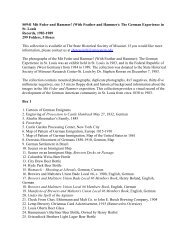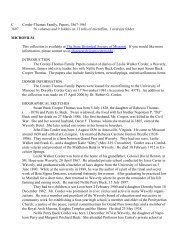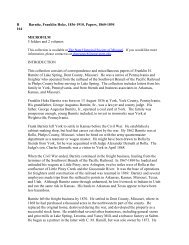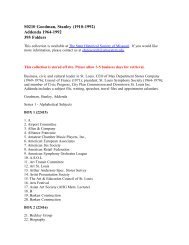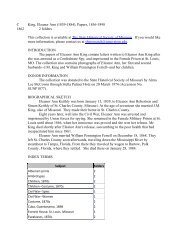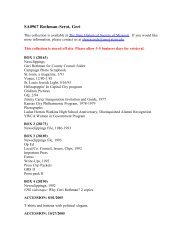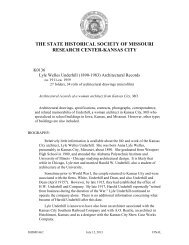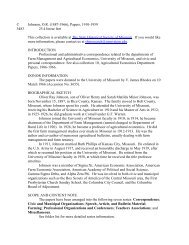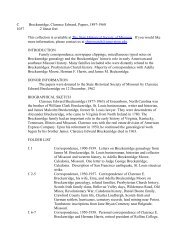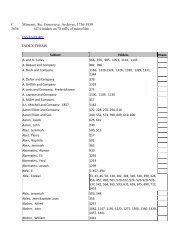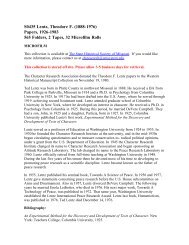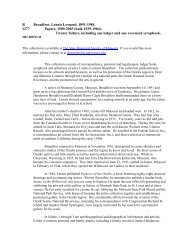MISSOURI TIMES - The State Historical Society of Missouri
MISSOURI TIMES - The State Historical Society of Missouri
MISSOURI TIMES - The State Historical Society of Missouri
You also want an ePaper? Increase the reach of your titles
YUMPU automatically turns print PDFs into web optimized ePapers that Google loves.
Western <strong>Historical</strong> Manuscript Collection<br />
Rolla<br />
Country fair souvenirs<br />
In one fashion or another, the carnivals, country fairs, and<br />
festivals underway across southern <strong>Missouri</strong> this season have<br />
origins in the last half <strong>of</strong> the nineteenth century. Important<br />
dates on the calendars <strong>of</strong> rural residents, country fairs have<br />
an ancient tradition associated with public gatherings for<br />
important liturgical, civic, and seasonal events. Country fairs<br />
as they developed in largely rural North America tended<br />
to be annual summer or fall harvest celebrations, with the<br />
added appeal <strong>of</strong> “farmers” markets, extended holidays, and<br />
public entertainment. Sponsored and promoted by formal<br />
and informal volunteer associations <strong>of</strong> rural farm families,<br />
stockmen, implement dealers, and merchants, fairs were<br />
agricultural and pastoral in<br />
emphasis and identified with<br />
distinct agricultural regions<br />
or civil districts. County<br />
seats became the usual<br />
location, but regional trade<br />
towns have also promoted<br />
“county” fairs. Large and<br />
small fairs have had common<br />
themes, but each is a unique<br />
expression <strong>of</strong> rural life and<br />
local culture.<br />
In the Western <strong>Historical</strong><br />
Manuscript Collection-<br />
Rolla collecting area,<br />
such events began in the<br />
late nineteenth century,<br />
although Cape Girardeau<br />
and Greene County hosted<br />
agricultural exhibitions or<br />
country fairs before the<br />
Civil War. Some developed<br />
in the principal trade<br />
towns out <strong>of</strong> associations<br />
styled “agricultural and<br />
mechanical,” while others<br />
derived from stock breeding<br />
groups and the racing <strong>of</strong> fast<br />
horses. As small family farms<br />
emerged in rural areas, the<br />
competitive spirit extended<br />
to the judging <strong>of</strong> livestock, agricultural and horticultural<br />
products, and the products <strong>of</strong> the domestic and culinary arts.<br />
Premiums or prizes for best-<strong>of</strong>-show in various categories<br />
brought awards ranging from ribbons to cash. Premium lists,<br />
first published to stimulate participation in the contests and<br />
attendance at the fairs, gave rise to a common bit <strong>of</strong> printed<br />
ephemera from the events—souvenir booklets combining<br />
programs <strong>of</strong> activities and lists <strong>of</strong> premiums, subsidized by<br />
local advertising.<br />
WHMC-Rolla collections represent country fairs in fourteen<br />
counties in southern <strong>Missouri</strong>. Souvenir booklets such as<br />
those from the Carthage Fair and Horse Show and Golden<br />
Valley Horse Show indicate origins <strong>of</strong> the events in horseracing<br />
circles, while those from Belle, Cuba, and Pleasant<br />
<strong>MISSOURI</strong> <strong>TIMES</strong> 10<br />
Valley are examples <strong>of</strong> fairs at places other than county<br />
seats. Greene County’s Ozark Empire Fair, Cape Girardeau’s<br />
Southeast <strong>Missouri</strong> District Fair, and Howell County’s Heart <strong>of</strong><br />
the Ozarks Fair and Stock Show developed into much larger<br />
regional celebrations. In the Bootheel, the American Legion<br />
Fair at Caruthersville grew significant enough to draw state<br />
and national figures such as Harry S. Truman, a fair visitor as<br />
senator, vice president, and in 1945 as president. In 1951 the<br />
souvenir booklet included a reproduction <strong>of</strong> Truman’s letter <strong>of</strong><br />
regret that he was not able to attend. In 1956 Emmett Kelly,<br />
a native <strong>of</strong> Texas County famous as the circus clown Weary<br />
Willie, headed the bill and graced the cover <strong>of</strong> the souvenir<br />
program <strong>of</strong> the Old Settlers<br />
Reunion and Texas County<br />
Fair.<br />
Souvenir booklets also<br />
reflect changes in local fairs<br />
in more recent times and<br />
the last days <strong>of</strong> the tradition<br />
in some cases. Auto racing<br />
and tractor pulls have<br />
replaced horse racing and<br />
pulling contests in most<br />
places, and entertainers are<br />
more likely to be country<br />
and pop celebrities rather<br />
than local fiddlers, bluegrass<br />
players, or brass bandsmen.<br />
<strong>The</strong> agricultural emphasis<br />
<strong>of</strong> fairs has diminished<br />
along with the small family<br />
farm, but the pastoral<br />
element remains strong in<br />
the stockraising counties.<br />
<strong>The</strong> trend seems to be for<br />
successful fairs to become<br />
larger, more regionally<br />
oriented, and sponsored in<br />
part by municipalities and<br />
local governments. Smaller<br />
fairs have always struggled<br />
financially; many have<br />
lapsed and been revived, or<br />
are now defunct. This year, 2009, twelve counties in southern<br />
<strong>Missouri</strong> will not stage countywide fairs. In some cases they<br />
have been subsumed by larger regional events, but elsewhere<br />
they are the result <strong>of</strong> shifting demographics, the high cost<br />
<strong>of</strong> public events, and the changing character <strong>of</strong> rural life. If<br />
the trend continues, the once-common souvenir booklets<br />
and printed ephemera <strong>of</strong> fairs big and small are ever more<br />
significant records <strong>of</strong> local history and country life.<br />
For further description <strong>of</strong> these and other WHMC-Rolla<br />
collections concerning seasonal events and recreational<br />
pursuits in southern <strong>Missouri</strong>, see Recreation and Sports in<br />
the broad topical categories on our Web page: http://web.mst.<br />
edu/~whmcinfo/topics/.



